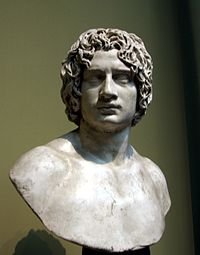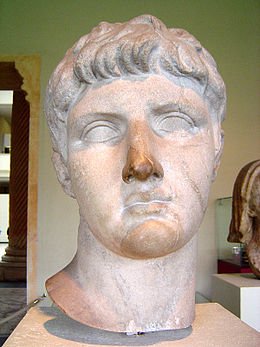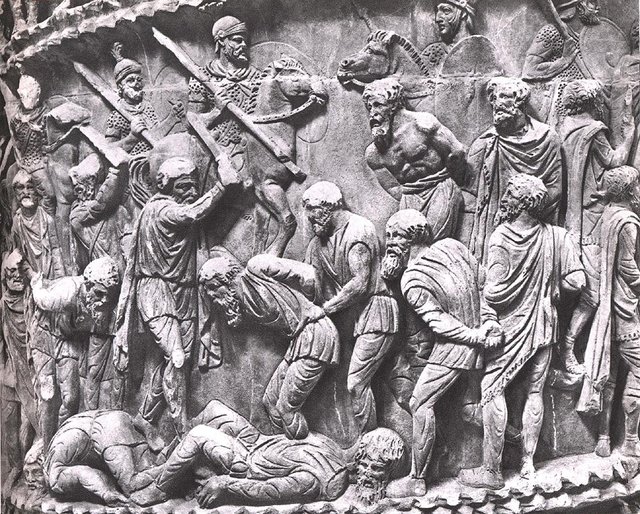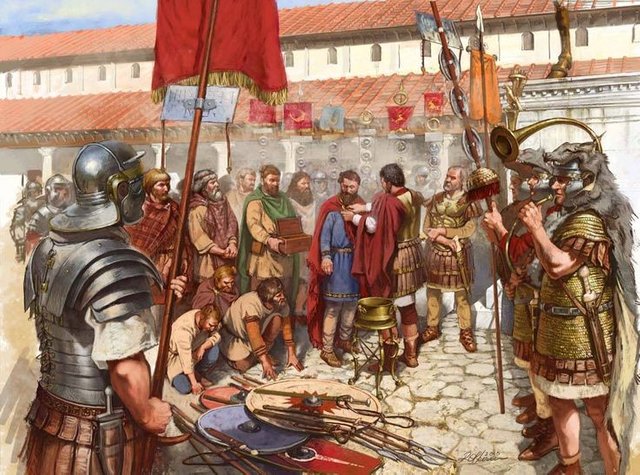ENEMIES OF ROME 6.2 - ARMINIUS - Pax Romana

A new frontier

He appointed his own stepson, Nero Claudius Drusus (picture on the right) to the task. Still in his 20s, he had proven himself a capable general and a fair politician in the province of Gaul. He started by building a series of forts along the Rhine to secure his rearguard, and from 12BC, made alliance with the Batavians tribes, who helped him navigate the treacherous North Sea to launch a naval attack from the mouth of the Ems river deep into Chauci territory (northern Germany).
In the following years, Drusus launched several new campaigns, defeating and submitting a collection of tribes in the process, even reaching as far south as the Werra Valley. He encountered resistance of course, and dodged the odd ambush more than once, but eventually by 10BC most of the tribes had submitted and those who had not submitted - like the Marcomanni - migrated east. In 9BC, Drusus reached and crossed the Elba river, the target set by Augustus as the new frontier. This exploit cost him dear: on the return, he fell from his horse and died a month later. He had secured for Rome a new frontier, much shorter and manageable, and for himself the title of Germanicus.

A piece of the column of Marcus Aurelius showing Germanic prisoners being beheaded. Even if Marcus Aurelius rules two full centuries later, the level of brutality in the campaigns of Germanicus must have been similar. [Source]
Submission
It was time now for a string of merchants, colonists and officials to take care of the new province and incorporate it in the economic and social fabric of the Empire. But the tribes the Romans encountered in Germany were somewhat different from the people they have submitted and governed so far. For once, they did not have cities, as says Tacitus:
It is well known that the nations of Germany have not cities, and that they do not even tolerate closely contiguous dwellings. They live scattered and apart, just as a spring, a meadow, or a wood has attracted them. Their village they do not arrange in our fashion, with the buildings connected and joined together, but every person surrounds his dwelling with an open space, either as a precaution against the disasters of fire, or because they do not know how to build. No use is made by them of stone or tile; they employ timber for all purposes, rude masses without ornament or attractiveness.
They were therefore hard to pin down, not only to fight, but also to tax! So, the Romans used the oldest trick of all to keep everyone in line: hostages.

[Source]
And of course, this is how starts the career of Arminius. As a son of a chieftain among the Cherusci tribe, called Segimer, he was sent to Rome - with his brother Flavus - to serve in the army as auxiliary. However, thanks to his ranks, Rome expected much more from him than brute force: Rome expected to secure the allegiance of his tribe, and to make sure that, when he would return home, he would teach his pesky subjects to follow the way of life and death of the Romans.
The childhood of a leader
As a matter of fact, Arminius was not probably his real name. It sounds too Latin for its own good, and it was surely the name his “mentors” gave him to accelerate his acculturation. He was taught Latin, served with his brother in the Roman army (probably in Illyria) , and eventually was granted full citizenship when he became adult and even reached equestrian status.
Therefore, when he came home around 7AD, one would expect Arminius - showered with gifts and honours by his Roman hosts - to be enthralled with the new regime and to be eager to convert his fellow countrymen towards the Roman way. Because it must have been the case for dozens of other hostages in the German tribes in all of Germania, hostages coming back and vaunting the efficiency and might of Rome. However, maybe Arminius changed as soon as he came back among his people, or maybe he never actually changed, but never really bought into the Roman propaganda, and, past the shock of being so far from home, started studying and analysing his new masters, bidding his time to lead a rebellion.
We’ll never know. We can just assume. We just know that, by the time he came back, he must not have liked what he saw.
TO BE CONTINUED... Previous episodes:
ENEMIES OF ROME 6.1 - ARMINIUS - Magna Germania
Sources:
http://sourcebooks.fordham.edu/halsall/basis/tacitus-germanygord.asp
https://en.wikipedia.org/wiki/Cimbri
http://www.historyfiles.co.uk/KingListsEurope/BarbarianTeutones.htm
https://en.wikipedia.org/wiki/Germanic-Roman_contacts
http://www.livius.org/articles/person/mithridates/http://www.livius.org/sources/content/appian/appian-the-mithridatic-wars/appian-the-mithridatic-wars-10/
Good and interesting post
Thanks a lot!
This post has been ranked within the top 50 most undervalued posts in the second half of Apr 25. We estimate that this post is undervalued by $3.28 as compared to a scenario in which every voter had an equal say.
See the full rankings and details in The Daily Tribune: Apr 25 - Part II. You can also read about some of our methodology, data analysis and technical details in our initial post.
If you are the author and would prefer not to receive these comments, simply reply "Stop" to this comment.
I like your post! 😻
Thanks a lot! :)